

Satellite Phone Communications. Iridium Communications. Iridium Communications Inc.
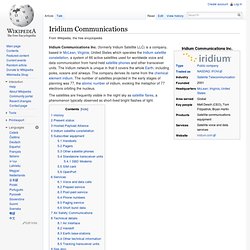
(formerly Iridium Satellite LLC) is a company, based in McLean, Virginia, United States which operates the Iridium satellite constellation, a system of 66 active satellites used for worldwide voice and data communication from hand-held satellite phones and other transceiver units. The Iridium network is unique in that it covers the whole Earth, including poles, oceans and airways. The company derives its name from the chemical element iridium. The number of satellites projected in the early stages of planning was 77, the atomic number of iridium, evoking the metaphor of 77 electrons orbiting the nucleus.
The satellites are frequently visible in the night sky as satellite flares, a phenomenon typically observed as short-lived bright flashes of light. History[edit] Iridium SSC, Iridium communications service was launched on November 1, 1998. Mismanagement is another major factor cited in the original program's failure. Present status[edit] Satellite Services - SES.com. SES S.A. SES S.A. is a global satellite owner and operator based in Betzdorf, Luxembourg and is listed on the Luxembourg Stock Exchange and Euronext Paris under the ticker symbol SESG.
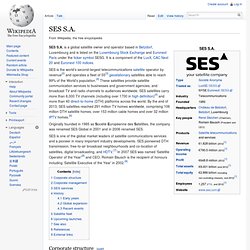
It is a component of the LuxX, CAC Next 20 and Euronext 100 indices. SES is the world’s second-largest telecommunications satellite operator by revenue[2] and operates a fleet of 55[3] geostationary satellites able to reach 99% of the World’s population.[4] These satellites provide satellite communication services to businesses and government agencies, and broadcast TV and radio channels to audiences worldwide.
SES satellites carry more than 6,000 TV channels (including over 1700 in high definition)[5] and more than 40 direct-to-home (DTH) platforms across the world. By the end of 2013, SES satellites reached 291 million TV homes worldwide, comprising 106 million DTH satellite homes, over 153 million cable homes and over 32 million IPTV homes.[6] Corporate structure[edit] Corporate management[edit] Home - LightSquared. Space Politics » LightSquared, problems squared. By Jeff Foust on 2011 June 23 at 7:57 am ET It’s tough enough to raise the billions of dollars needed to build out a nationwide hybrid satellite/terrestrial wireless network, as LightSquared has found.
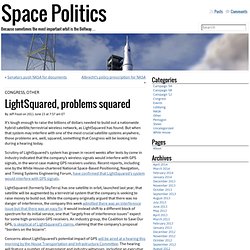
But when that system may interfere with one of the most crucial satellite systems anywhere, those problems are, well, squared, something that Congress will be looking into during a hearing today. Scrutiny of LightSquared’s system has grown in recent weeks after tests by come in industry indicated that the company’s wireless signals would interfere with GPS signals, in the worst case making GPS receivers useless. Recent reports, including one by the White House-chartered National Space-Based Positioning, Navigation, and Timing Systems Engineering Forum, have confirmed that LightSquared’s system would interfere with GPS signals. Concerns about LightSquared’s potential impact of GPS will be aired at a hearing this morning by the House Transportation and Infrastructure Committee.
LightSquared. LightSquared is a company that seeks to develop a wholesale 4G LTE wireless broadband communications network integrated with satellite coverage across the United States using a block of frequencies located near the band used by the Global Positioning System (GPS).
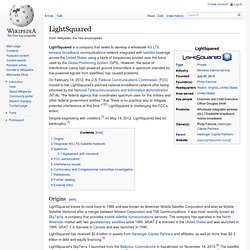
However, the issue of interference (using high-powered ground transmitters in spectrum intended for low-powered signals from satellites) has caused problems. On February 14, 2012, the U.S. Federal Communications Commission (FCC) moved to bar LightSquared's planned national broadband network after being informed by the National Telecommunications and Information Administration (NTIA), "the federal agency that coordinates spectrum uses for the military and other federal government entities," that "there is no practical way to mitigate potential interference at this time.
"[1][2] LightSquared is challenging the FCC's action. Despite negotiating with creditors,[3] on May 14, 2012, LightSquared filed for bankruptcy.[4] Surrey Satellite Technology Ltd (SSTL) Surrey Satellite Technology. Surrey Satellite Technology Ltd, or SSTL, is a spin-off company of the University of Surrey, now majority-owned by EADS Astrium, that builds and operates small satellites.
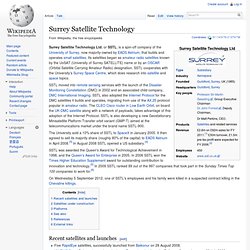
Its satellites began as amateur radio satellites known by the UoSAT (University of Surrey SATELLITE) name or by an OSCAR (Orbital Satellite Carrying Amateur Radio) designation. SSTL cooperates with the University's Surrey Space Centre, which does research into satellite and space topics. The University sold a 10% share of SSTL to SpaceX in January 2005. It then agreed to sell its majority share (roughly 80% of the capital) to EADS Astrium in April 2008.[3] In August 2008 SSTL opened a US subsidiary.[4] SSTL was awarded the Queen's Award for Technological Achievement in 1998, and the Queen's Award for Enterprise in 2005. On Wednesday 5 September 2012, one of SSTL's employees and his family were killed in a suspected contract killing in the Chevaline killings.
Recent satellites and launches[edit] LOMONOSOV[citation needed]